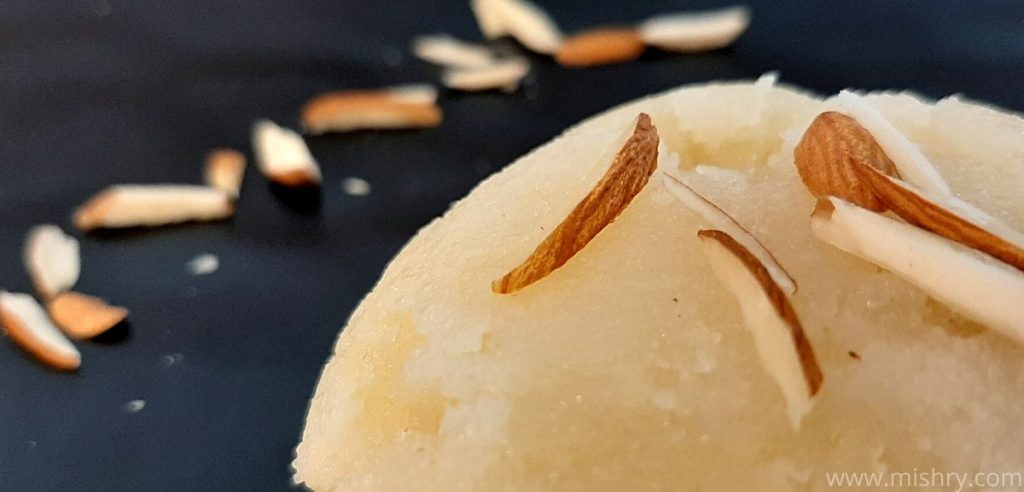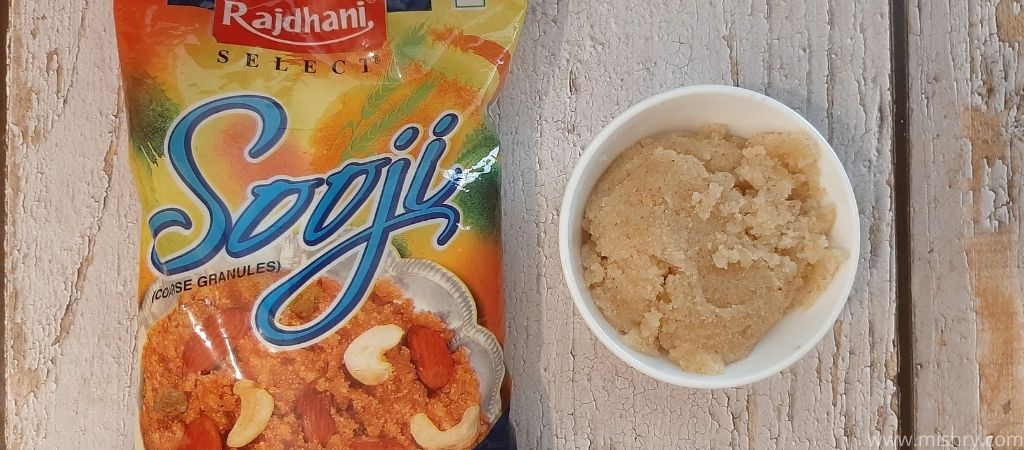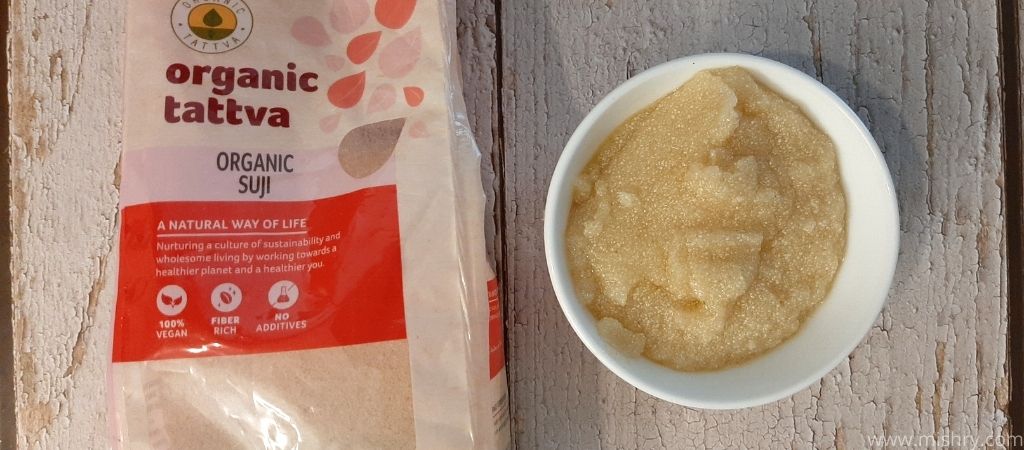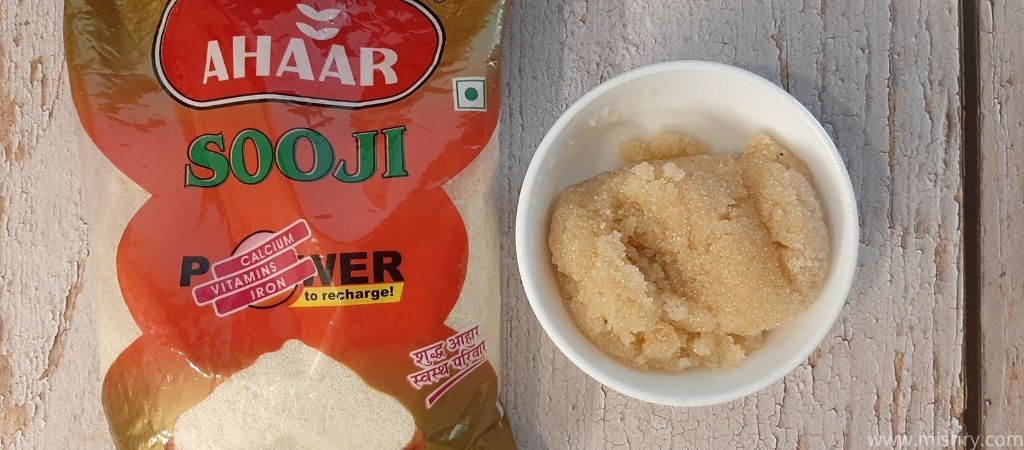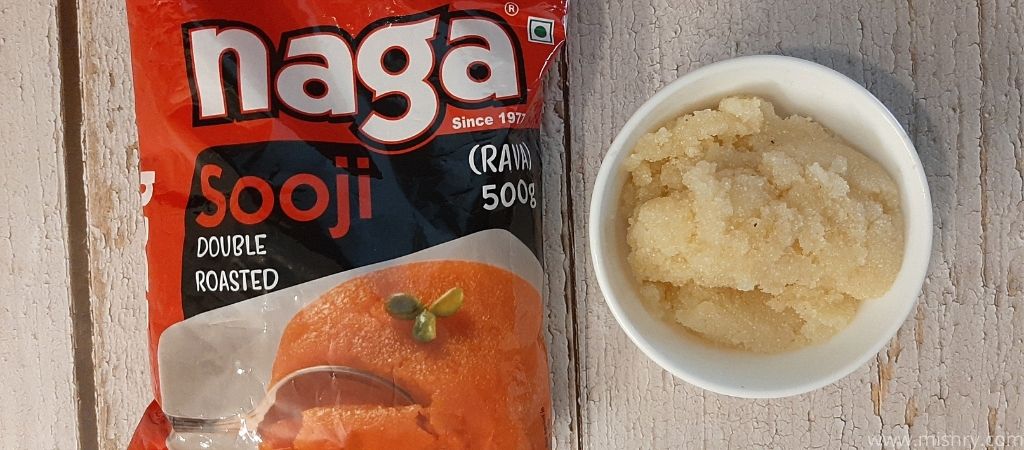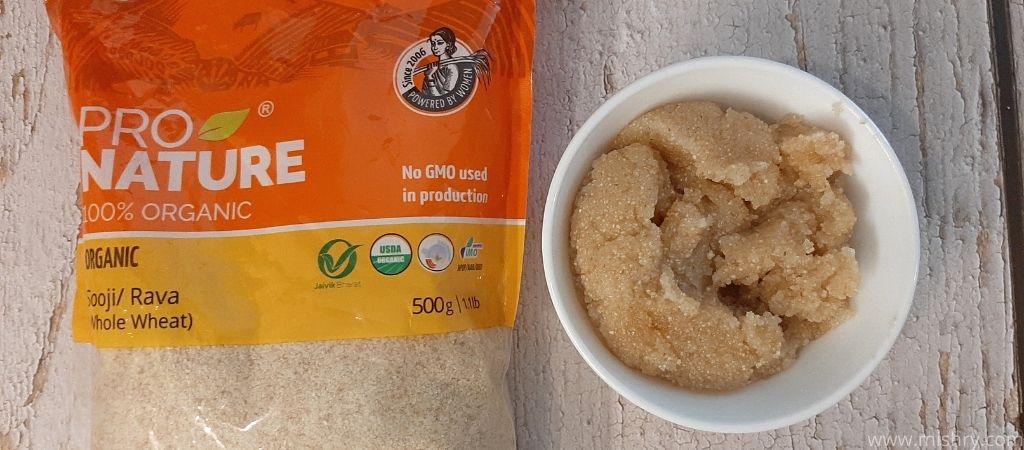Sooji or suji is used to make a number of recipes like paniyarams, cheelas, uttapams, upma, and kheer. But halwas in the sweet category and idlis in the savory category are two dishes that surpass everything else. We tested six brands by sooji manufacturers in India using two popular dishes – Sooji ka halwa and Instant Sooji Idlis.
After researching and testing them for both recipes over several days, we can say that Rajdhani Sooji is one of the best semolina brands in India to make plump halwas. We Also Recommend 15 No. Sooji for a smooth, fine-textured halwa. Organic Tattva won in the organic category of rava brands.
During our idli testing phase, Rajdhani Sooji and Organic Tattva Sooji emerged as winners in their respective categories.
Table of Contents
Best Sooji Brand In India – Detailed Review
A tabular comparison of the contenders in our review of the Best Sooji Brand In India. Their price, grammage, and shelf life are mentioned below.
Best Sooji Brands In India – Contenders
[porto_carousel stage_padding=”0″ margin=”10″ autoplay=”yes” autoplay_timeout=”5000″ items=”2″ items_lg=”2″ items_md=”3″ items_sm=”2″ items_xs=”1″]
Top Pick (Halwa + Idli)
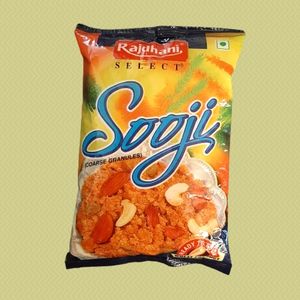
Organic Pick (Halwa + Idli)
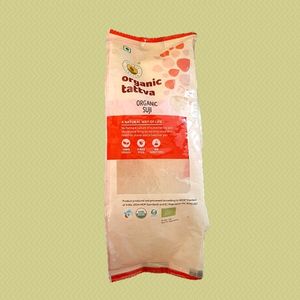
Recommended (Halwa)
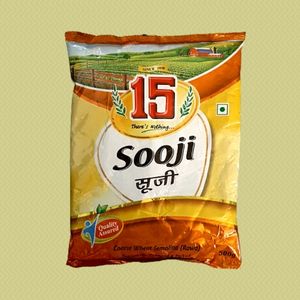
Reviewed

Reviewed
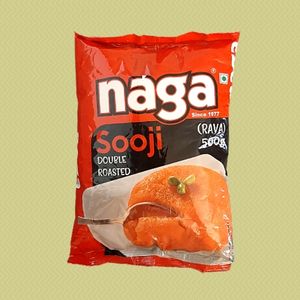
Reviewed
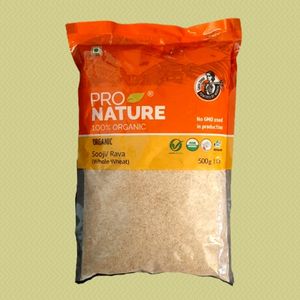
Best Sooji Brands In India– Everything You Need To Know
In this section we discuss the sooji brands in India we selected for our review, available sizes, price range, packaging, shelf life, and more.
1. Reviewed Brands
We picked four popular brands in the regular sooji category –
- Ahaar
- Rajdhani
- Naga Suji
- 15 No. Sooji
We picked two brands in the organic category –
- Pro Nature Organic
- Organic Tattva
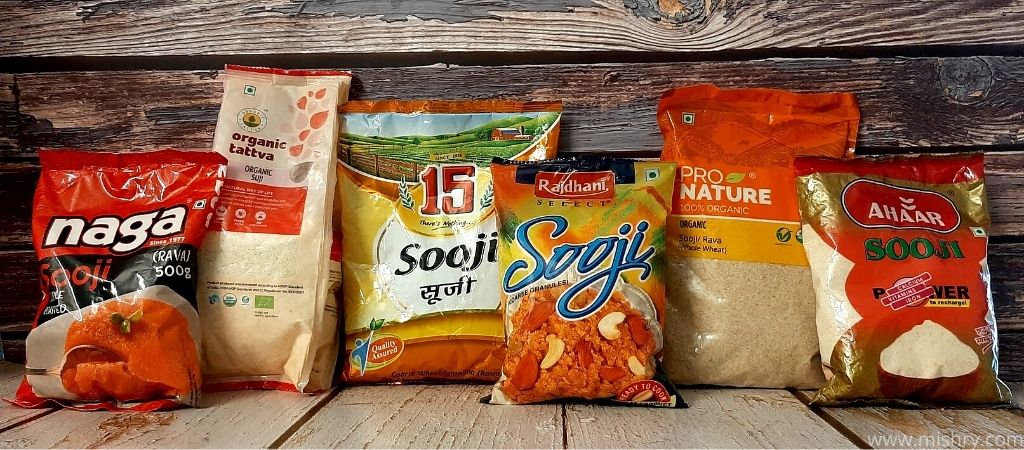
Although popular in some parts of the country, we did not include brands like Shakti Bhog, Patanjali, Selecta and Madam due to erratic availability in our region.
2. Available Sizes
Packaged sooji is available in two sizes –
- 500 grams
- 1 kg
3. Price Range
On average the price of 500 grams of suji is between Rs 35 – Rs 40/-. Sujis in organic category, of course, are slightly on the higher side and can go up to 55-60 Rupees for 500 grams.
4. Packaging
Sooji is usually packaged in a plastic pouch which is not resealable. It is best to transfer the contents of the pack in an airtight container.
5. Shelf Life
The shelf life of sooji differs from brand to brand. It can vary from 3 months to 9 months. Please read the label carefully.
6. Availability
The above-mentioned sooji brands are easily available offline and online on selected portals.
Related Reading:
We listed top reasons to add more Suji to your diet.
Best Semolina Brands In India – Our Review Process And Factors
Sooji is a staple in all Indian kitchens. Owing to its versatility, testing it for just one recipe would not have been fair.
In fact, come to think of it, it’s rare for us to buy two different types of suji for our home needs. We buy one brand and use it for multiple dishes at home, from halwas, to uttapams and idlis. This is why we chose to test all brands for the two most popular dishes they are used for at home – quintessential Halwa, and steamed Idli.
To test the suji, we used standardized recipes for both dishes. No extra seasoning, herbs, or aromatics were used in either of the recipes so we could discern the freshness and flavor of the suji brands used.
Process For Halwa
- We took the same measurements for all the brands to standardize the procedure.
- We measured 45 grams of sooji, 25 grams of sugar, 90 grams of water, 1 Tbsp + 1 tsp ghee for the halwa.
- No cardamom or almonds are used to enhance the flavor of the dish.
- In a pan, we roasted the suji in ghee for an exact 1.5 minutes on medium heat.
- Then we added sugar (25 grams) and roasted it for another 50-60 seconds.
- Then, we added water and closed the lid. We stirred it well and served it.
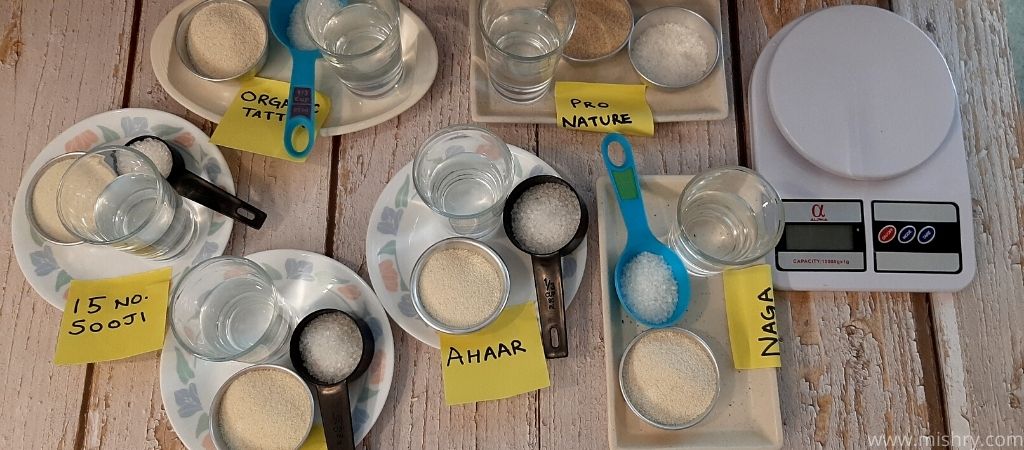
Process For Idlis
- For each brand we mixed ¼ cup suji, a pinch of salt and ¼ cup curd.
- We let this rest for 10 minutes before adjusting the quantity with the desired amount of water. All brands took different amounts of water to reach the perfect dropping consistency.
- Once done we added ⅛ tsp fruit salt to the batter, mixed it lightly and steamed the idlis in a rice cooker. Our idli stand was greased well with refined oil.
- We steamed all the idlis for 8 minutes.
- We tasted them twice – once fresh out of the steamer and then during the comparative stage after a few minutes.
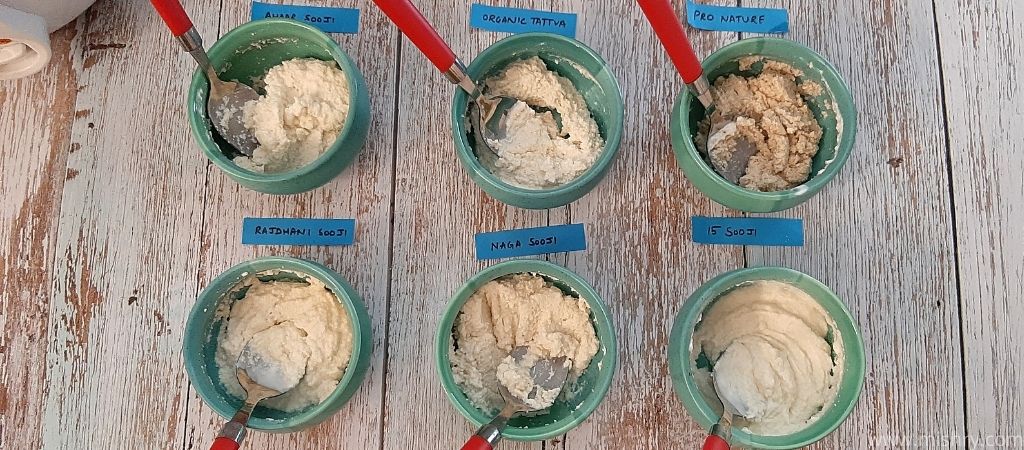
We set the following parameters –
1. Visual Inspection
The visual inspection involved us checking the sooji brands for the following –
-
Color check –
The color of the sooji should be white/off-white. It should not be yellow.
-
Bugs/Grit –
We checked the sooji visually for any bugs and grit.
2. Texture
Sooji has a very grainy, sand-like texture. We wanted to check the sooji for its graininess, size of the specs and the mouthfeel of sooji after it is cooked.
3. Plumpness And Bulking Up Quality
Halwas – How much and how well did the sooji plump up post-cooking? We weighed the suji before and after cooking (halwa) to check which sooji plumped up the most. Basically, how much halwa was made from the same amount of measurements?
Idlis – How fluffy and soft are the idlis? Does the sooji plump up?
4. Aroma
Sooji typically has an earthy aroma and shouldn’t have a musty smell. We checked all the brands for any off-putting aroma.
5. Value For Money
How is the brand of sooji priced? Is it priced competitively? The bulking up quality of the sooji inherently will determine its value for money factor.
Related Reading:
Here are 5 quick ways to use semolina.
1. Rajdhani Sooji – Mishry Top Pick
Rajdhani Sooji’s grain size is neither too fine, nor too thick. It is medium-coarse and has a sand-like texture. Upon visual inspection, we did not find any foreign particles. The color of the sooji is off-white. It has a characteristic earthy aroma.
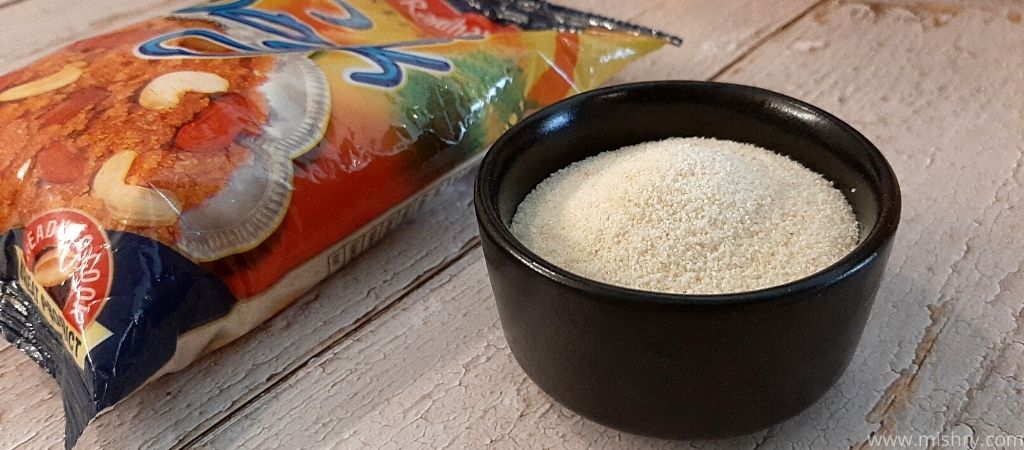
Features
- Rajdhani sooji is priced at Rs 39/- for 500 grams.
- The shelf life of the sooji is 3 months.
- Ingredients – Wheat
- Energy per 100 grams is 352 kcal.
1. Halwa Dish with Rajdhani Sooji
The halwa made using Rajdhani Sooji plumped up very well. The dry 45-gram sooji bulks up to 141 grams. This produced a well-roasted, light brown halwa with the best mouthfeel.
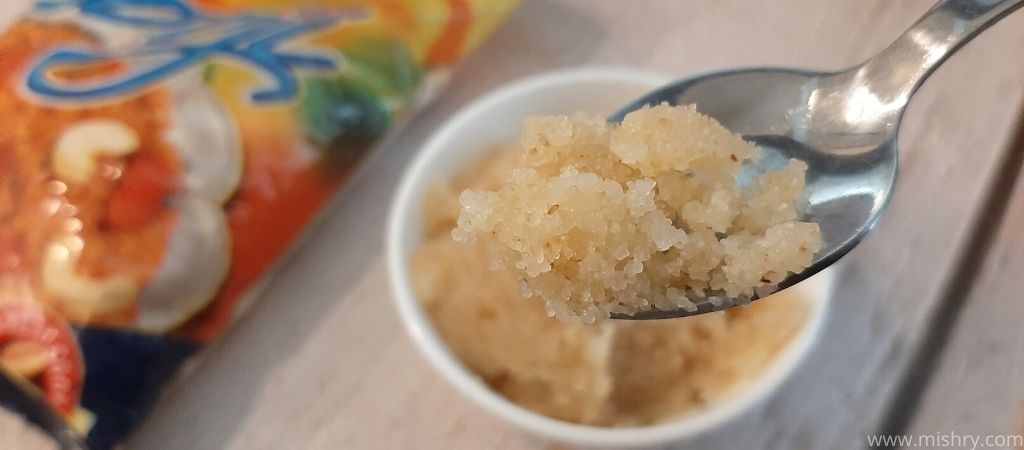
2. Idli Dish with Rajdhani Sooji
Sooji idlis should be fluffy and not sticky. Rajdhani sooji idlis have the perfect fluffy texture without them disintegrating or becoming crumbly. The sooji grains hold onto each other very nicely without becoming sticky.
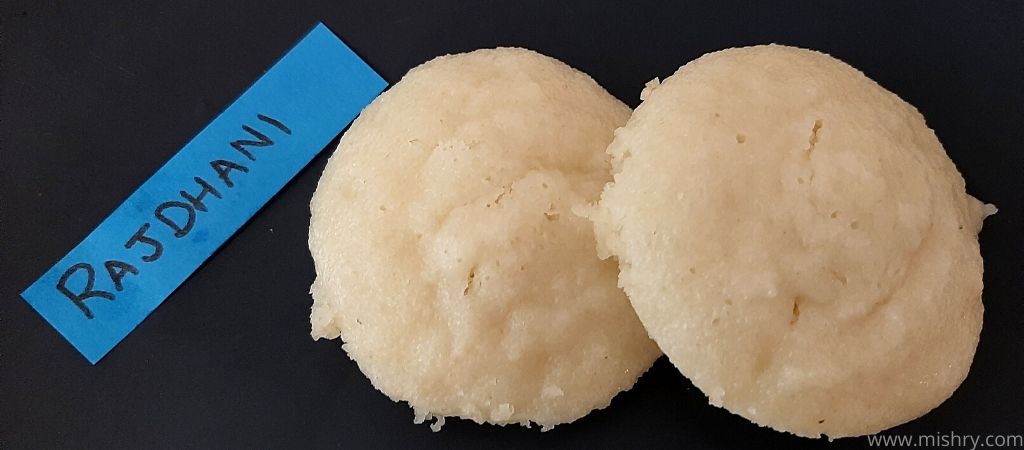
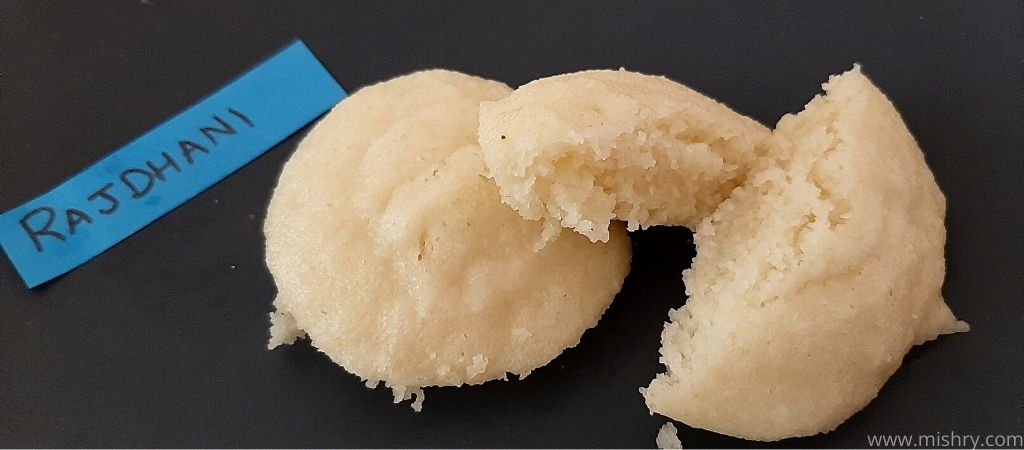
Pros
- The sooji has a fresh, earthy aroma.
- It plumped up well when turned into a halwa.
- It is priced competitively.
- The aroma is earthy.
- This made a batch of fluffy, soft idlis.
Best Suited For
People who like eating a coarser moti-sooji halwa would prefer Rajdhani Sooji. This can also be used to make soft, fluffy idlis.
2. Organic Tattva Sooji – Mishry Organic Pick
The grain of the sooji by Organic Tattva is medium-coarse and has an off-white color. There are no foreign particles or an off-putting smell in the sooji.
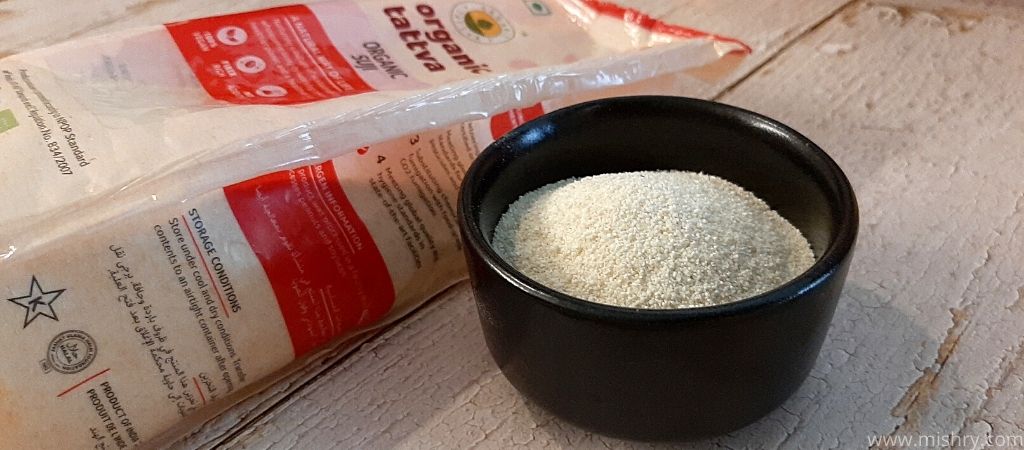
Features
- Organic Tattva Sooji is priced at Rs 55/- for 500 grams.
- The shelf life of the sooji is 9 months.
- Ingredients are not mentioned on the pack.
- Energy per 100 grams is 350 Kcal.
1. Halwa Dish with Organic Tattva Sooji
Our pick in the organic category, Organic Tattva produced a halwa with one of the best textures. At 155 grams, it bulked up the most amongst all the sooji brands we tested for halwas.
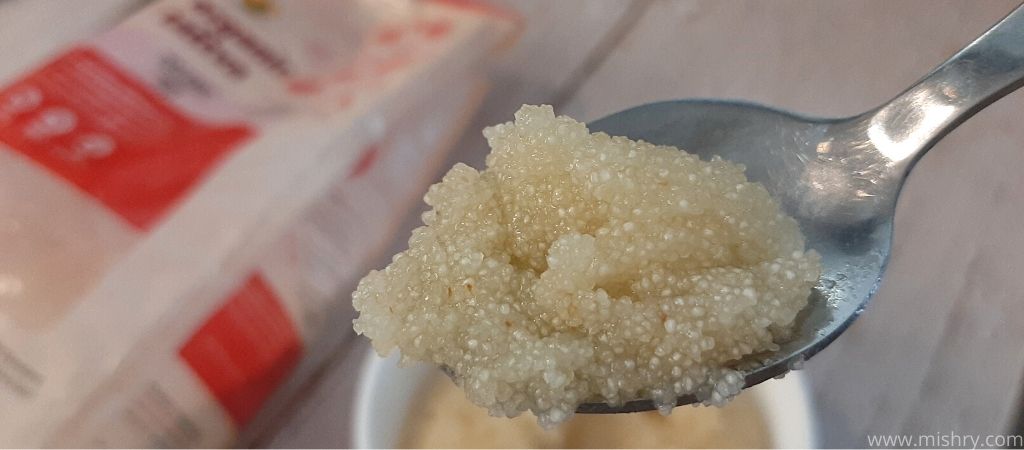
2. Idli Dish with Organic Tattva Sooji
The idlis are soft, fluffy with a mild earthy flavor that doesn’t change the mouthfeel of a sooji idli. We found these idlis to be one of the best amongst our testing.
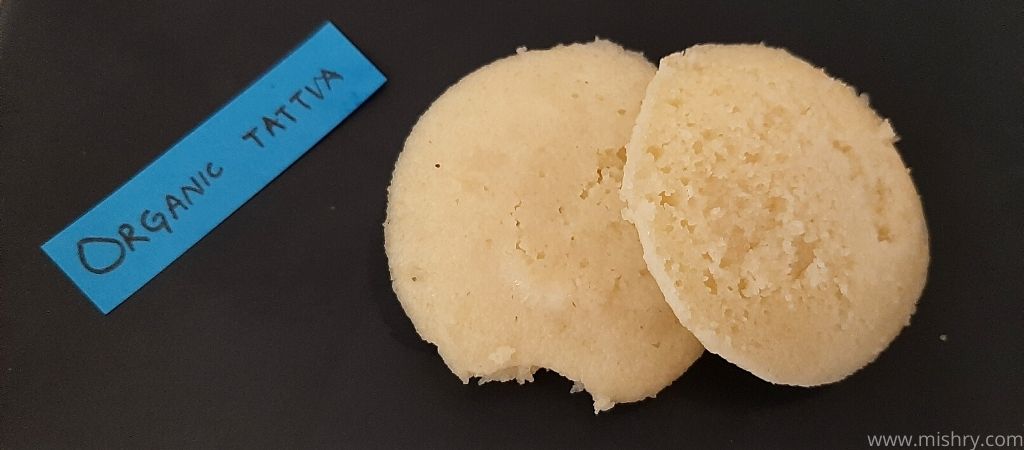
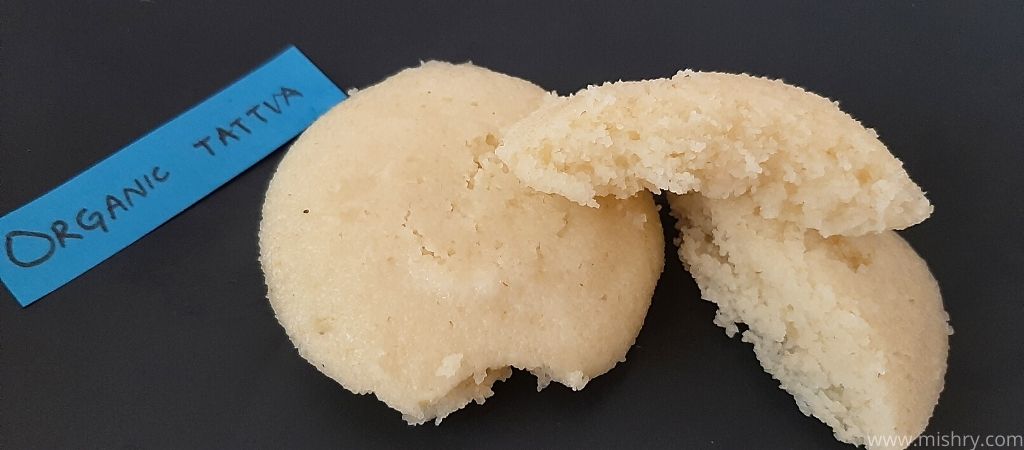
Pros
- The sooji bulked up the most during the halwa making stage.
- This is organic.
- The sooji plumps up well and has a good mouthfeel.
- The aroma is earthy.
- The idlis are soft and fluffy.
Best Suited For
If you are looking for an organic sooji, we recommend the one by Organic Tattva.
3. 15 No. Sooji – Also Recommended For Halwas
15 No. Sooji has the finest grain size amongst all the contenders. It is also the lightest in color. No foreign particles were found during the visual inspection stage.
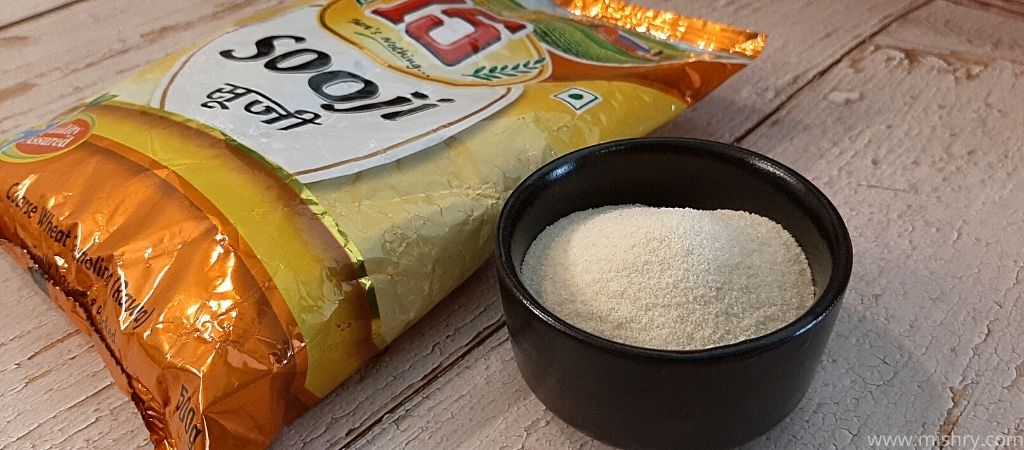
Features
- 15 No. Sooji is priced at Rs 35/- for 500 grams.
- The shelf life of the sooji is 6 months.
- Ingredients – Wheat semolina (rava)
- Energy per 100 grams is 353 Kcal.
1. Halwa Dish with 15 No. Sooji
The halwa made using 15 No. Sooji was the finest, most non-granulated halwa in comparison to all the others. For people who like to use bareek sooji for halwas and upmas, this brand provides the best results. The dry 45 gram sooji bulks up to 149 grams.
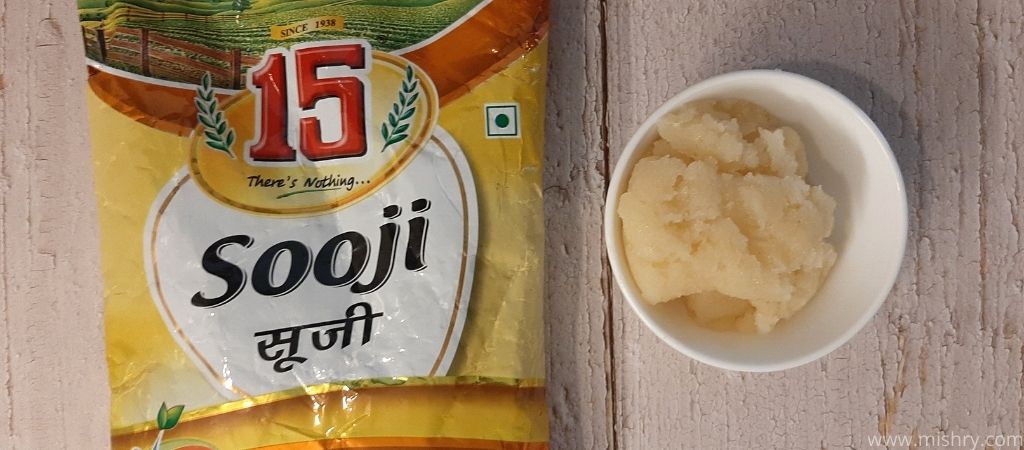
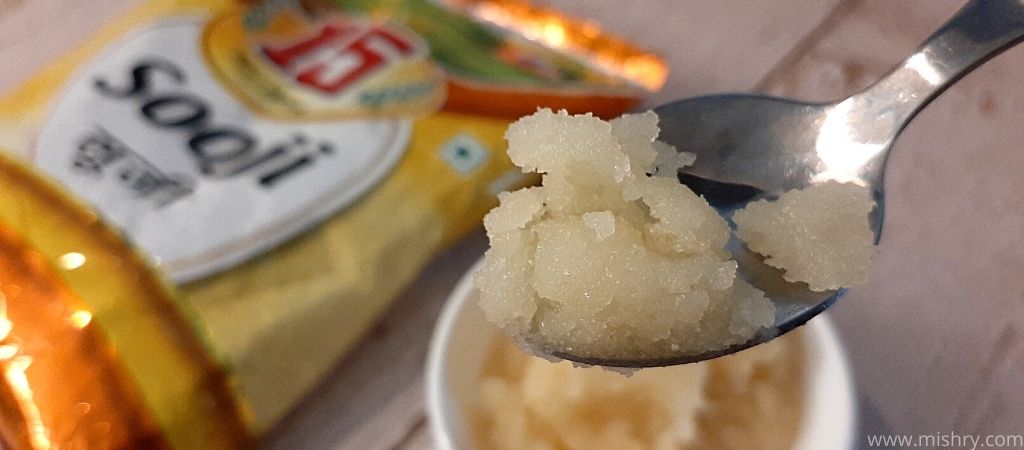
2. Idli Dish with 15 No. Sooji
The idlis we made using 15 No. Sooji were too sticky, which is why this brand is not recommended for making idlis. The idlis had an unfavorable texture.
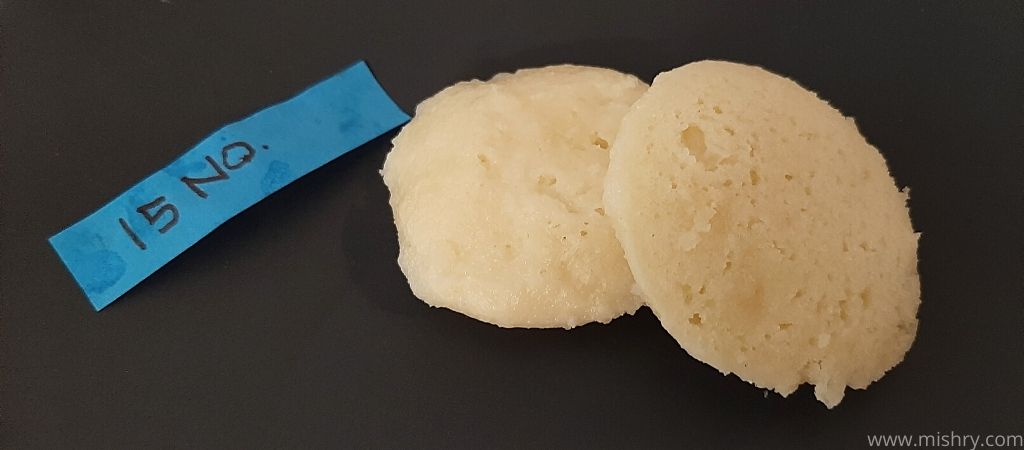

Pros
- The sooji has a very fine texture, thus making the halwa very smooth and non-granulated.
- The grain of sooji plumps up well.
Cons
- This brand is not recommended for making idlis.
Best Suited For
If you are someone who likes a smooth, fine-textured halwa, the 15 No. Sooji is for you. It is the best sooji to make halwas with a fine grain size and a smooth mouthfeel.
4. Ahaar Sooji
Just like Rajdhani, Ahaar too was off-white in color with a medium coarse texture. Both the brands came very close in terms of physical attributes. The difference came when we cooked with them.
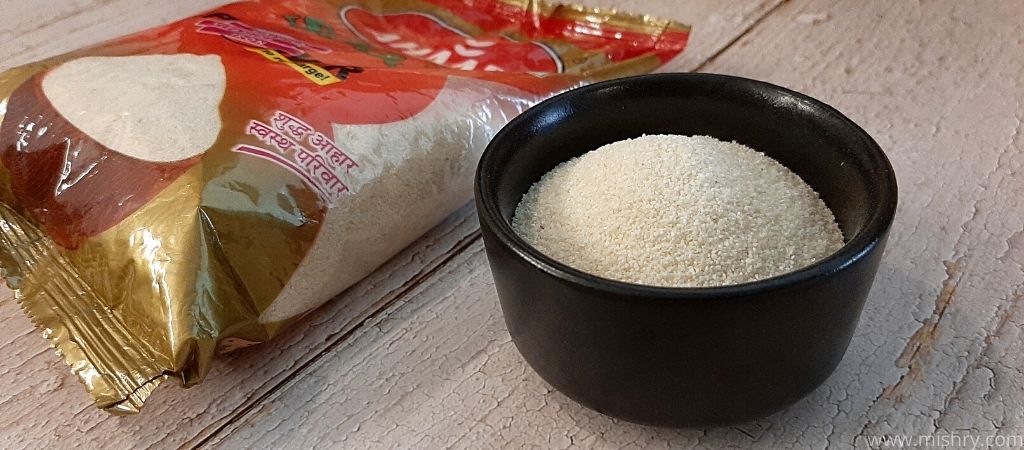
Features
- Ahaar Sooji is priced at Rs 40/- for 500 grams.
- The shelf life of the sooji is 4 months.
- The ingredients are not mentioned on the pack.
- Energy per 100 grams is 352 Kcal.
1. Halwa Dish with Ahaar Sooji
Even though Ahaar and Rajdhani came very close to each other taste wise, the halwa made using Ahaar was a bit more granulated and coarser than Rajdhani which ultimately reduced the mouthfeel. Moreover, Ahaar sooji bulked up the least (134 grams) which ultimately would reduce its points in the value for money section.
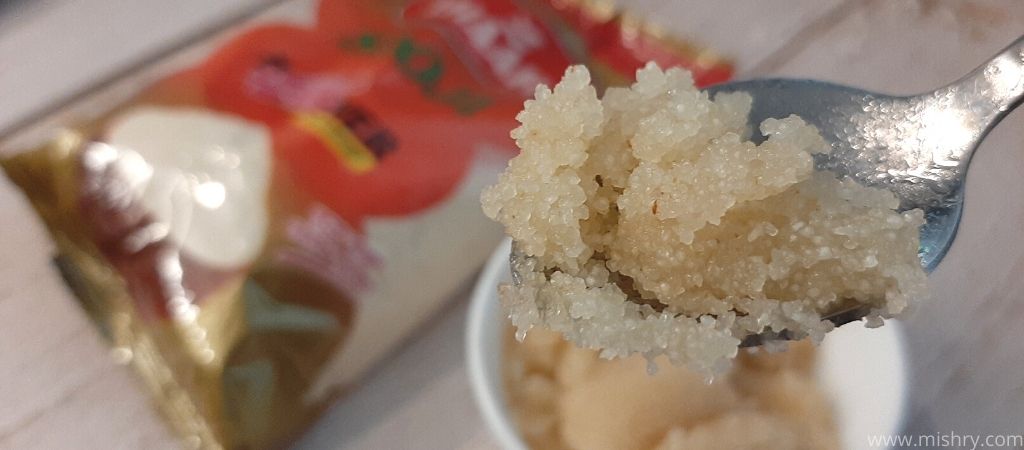
2. Idli Dish with Ahaar Sooji
Sadly, the idlis made using this brand are not as fluffy as our Top Pick and are drier as well.
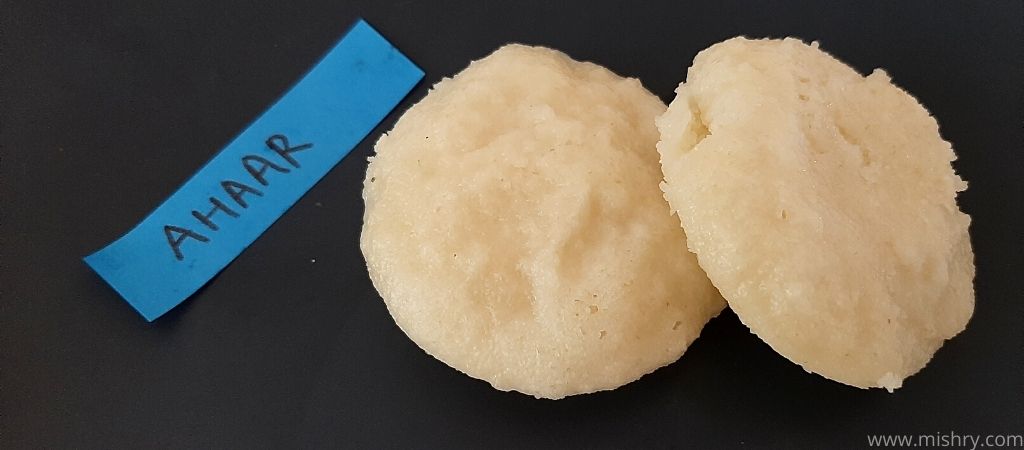
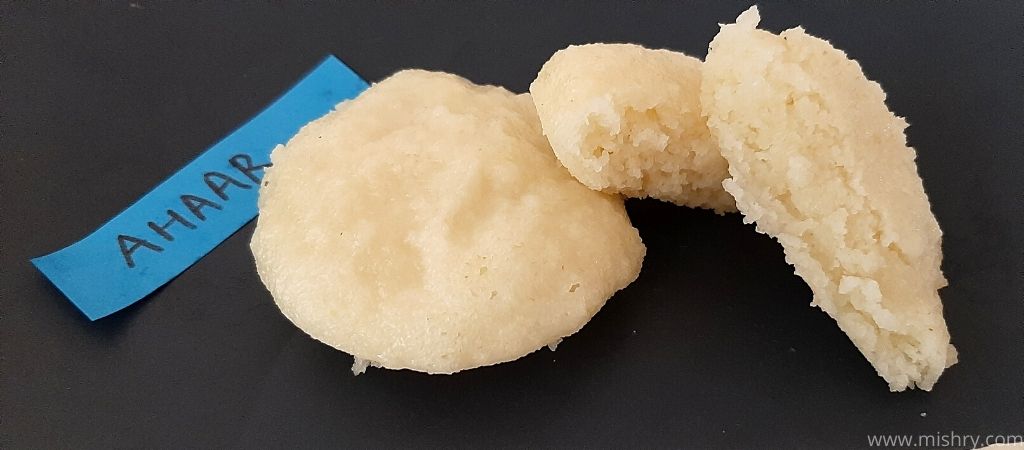
Pros
- The sooji by Ahaar is free from any foreign particles.
- It has a fresh, earthy aroma.
Cons
- The bulking up quality of Ahaar sooji is the lowest.
- The idlis made using this brand are drier and not as fluffy.
5. Naga Sooji
An extremely popular brand in the South, Naga Sooji is double roasted. It has an earthy aroma and no foreign particles were detected. The grain is medium-coarse.
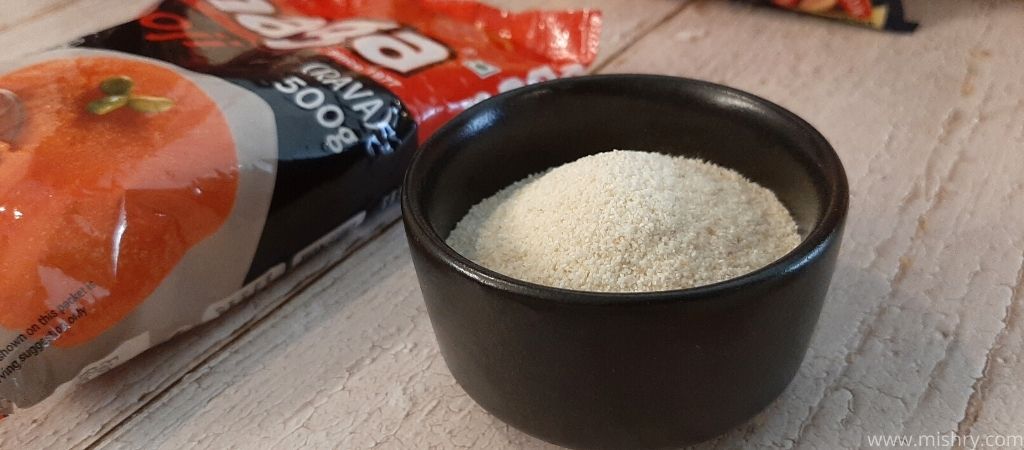
Features
- Naga Sooji is priced at Rs 36/- for 500 grams.
- The shelf life of the sooji is 3 months.
- Ingredients – Wheat. Category: Semolina
- Energy per 100 grams is 358 Kcal.
1. Halwa Dish with Naga Sooji
The reason Naga Sooji could not inch ahead in the halwa segment was that it became clumpy and was unable to take on the flavor of the ghee as well as the others. Our recipe and procedure were standardized and there was no variation in the time of roasting or the ratio of sugar and water added.
Moreover, Naga Sooji also did not bulk up as much (138 grams). It stood second last in that analysis.
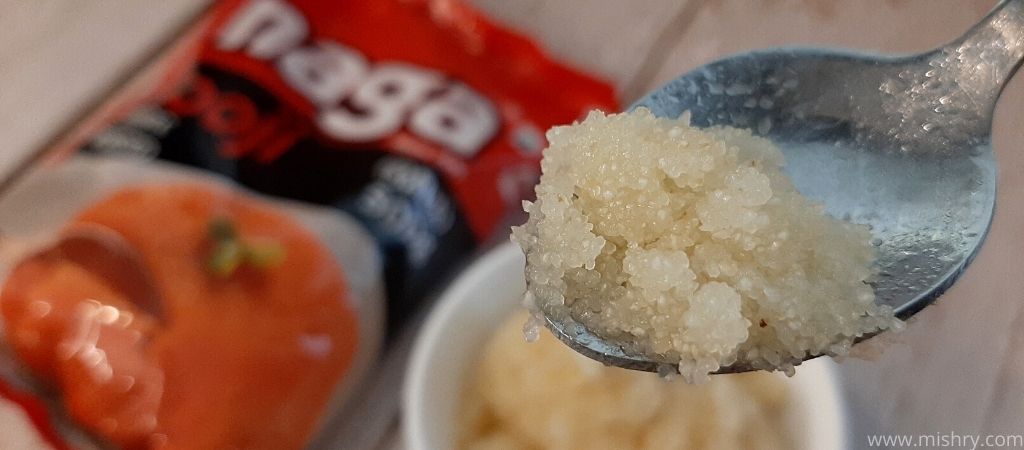
2. Idli Dish with Naga Sooji
The idlis made using Naga Sooji were soft and fluffy and came very close to our Top Pick. In a comparative situation, these idlis were then marked a notch below the winner.
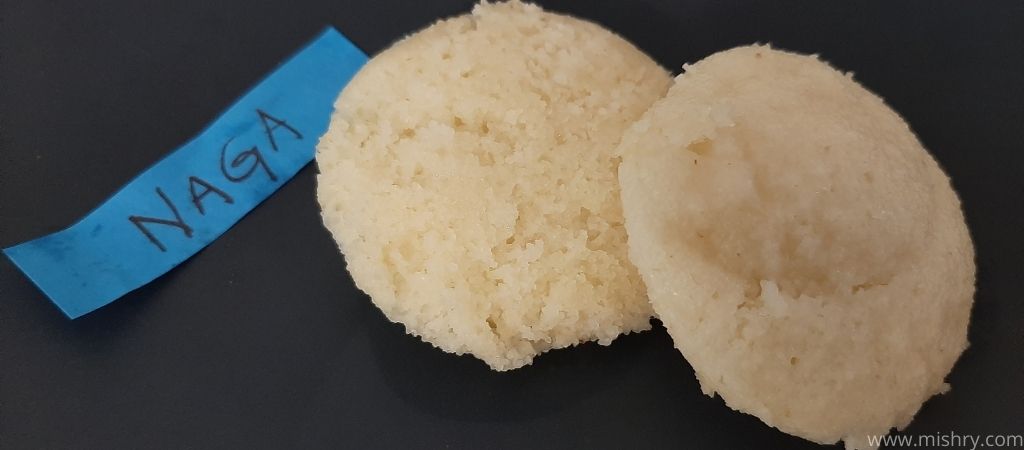
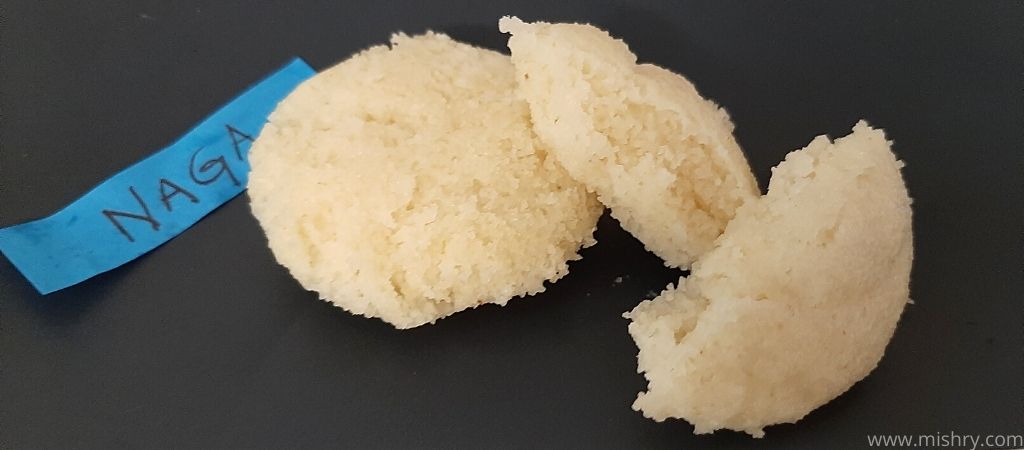
Pros
- It is double roasted.
- The sooji has an earthy aroma.
- The sooji idlis were soft and fluffy.
Cons
- Naga Sooji was unable to bulk up as much as our winners.
6. Pro Nature Organic Sooji
Pro Nature Organic Sooji had the darkest color amongst all the brands we picked for our review. It was also the most coarse.
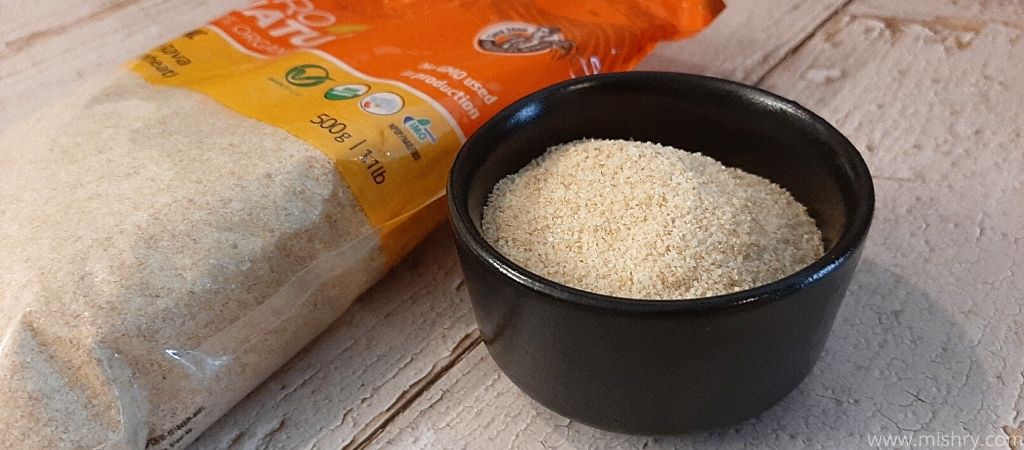
Features
- Pro Nature Organic Sooji is priced at Rs 53/- for 500 grams.
- The shelf life of the sooji is 6 months.
- Ingredients – Organic Suji/Rawa (Whole wheat)
- The nutrition label is not mentioned on the pack.
1. Halwa Dish with Pro Nature Sooji
The fact that our halwa tasted and looked on the lines of a sweetened wheat daliya, we can say that the sooji by Pro Nature is not meant for this use. Although the sooji bulked up fairly well (142 grams), we wouldn’t recommend this for making halwas.
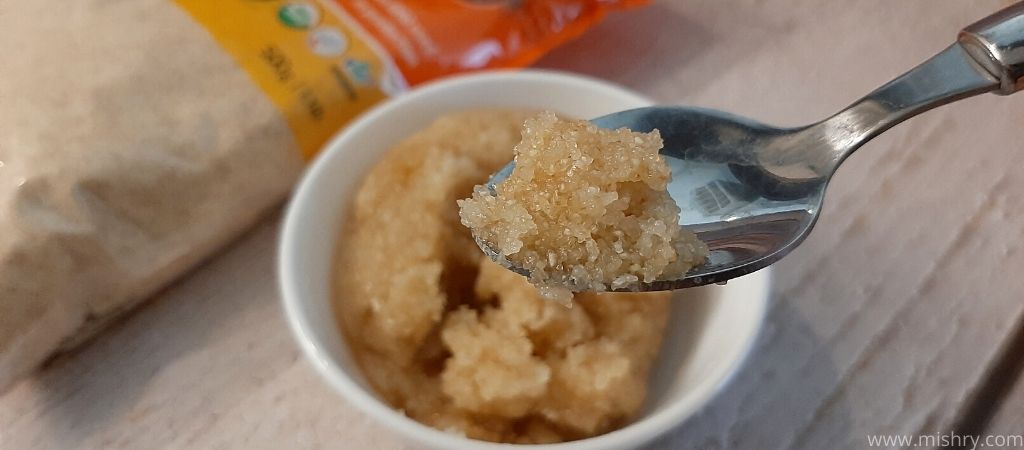
2. Idli Dish with Pro Nature Sooji
Pro Nature sooji made delicious idlis. But the mouthfeel of what a sooji idli should be was not upto the mark.
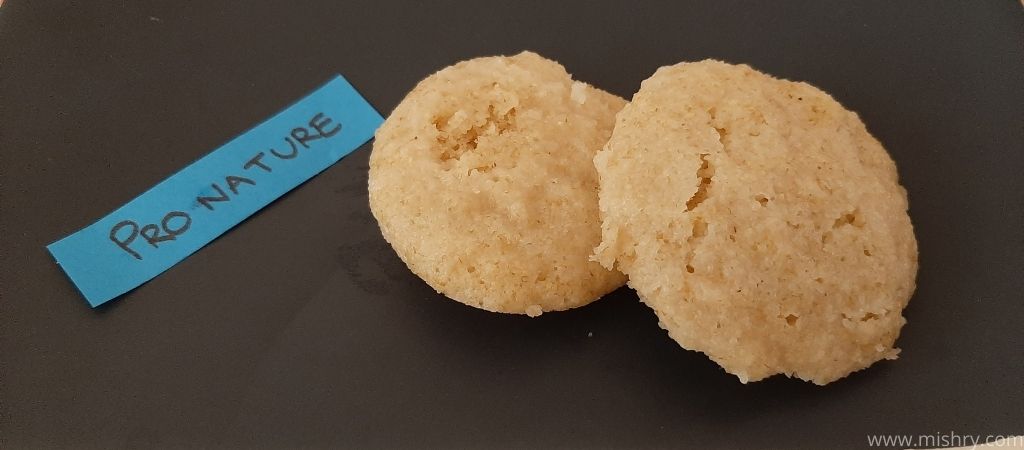
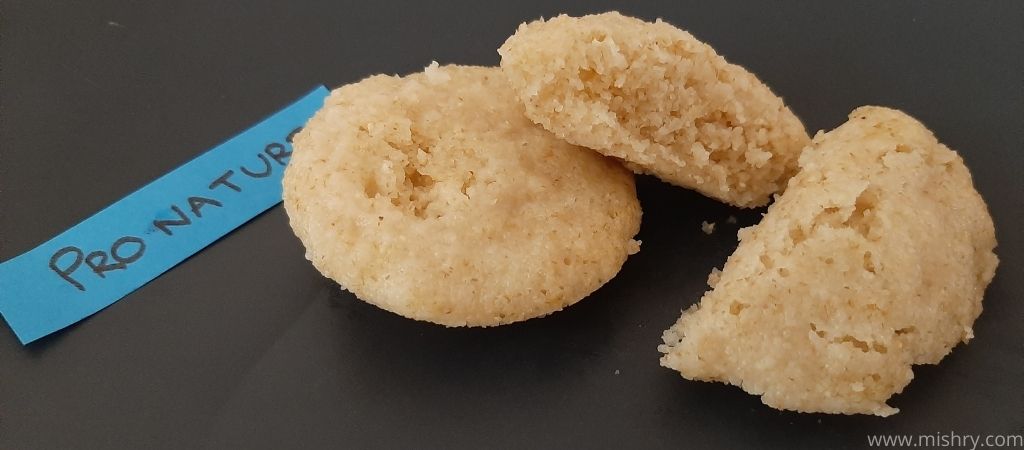
Pros
- This is organic.
- The idlis made using this brand were soft and fibrous.
Cons
The sooji grain is too coarse. Our halwa tasted and looked more on the lines of a daliya than a halwa.
Related Reading:
We curated a list of quick and easy recipes you can try with suji.
Best Semolina Brands In India– Our Top Picks & Recommendations
Monthly groceries come in bulk and are meant to last till the end of the month. There are hardly any people that would buy different brands of sooji for different dishes. Most of us will use the same brand for halwas, chillas, upma and idlis. This is why Rajdhani emerged as our Top Pick. It is best suited for both – halwas and idlis. From our organic section, it was Organic Tattva that excelled in both recipe tests.
None of them smelled musty and neither did they have any foreign particles in it.
Here are the details on the winners of the best semolina brands in India –
Best Rava Brand For Halwa and Idlis
Mishry Top Pick –
The award for the best semolina brand in India for making halwa goes to Rajdhani Sooji. The earthy aroma and the marginally granulated halwa we made using this brand had the best texture and mouthfeel. The idlis made using Rajdhani turned out to be the softest and fluffiest.
Mishry Organic Pick –
Organic Tattva won this title for its excellent mouthfeel and bulking up quality (it bulked up the most). The idlis made using this brand were soft and fluffy.
Recommended for halwas –
For people who want a smooth and fine textured halwa, the 15 No. Sooji is our pick. This suji is not recommended for idlis.
Read more here – What is the difference between rava and suji?
Frequently Asked Questions
Here are some interesting FAQs on the best sooji brand in India.
1. Is there any difference between rava, suji and semolina?
Semolina, rava and suji are all made using the same ingredients – wheat. The size of the ‘grain’ might vary minutely between suji and rava, but other than that there isn’t a lot of difference. The name varies geographically, suji in the North and rava in the South.
2. Do rava and sooji yield the same taste after cooking?
Yes. The ‘grain’ size may vary a little, but they taste the same.
3. Which sooji brand is good for halwa?
As per our review, Rajdhani sooji is the best brand for making a danedar halwa. If you wish to make a smooth halwa, we suggest the 15 No. Sooji. If organic sooji is what you’re looking for, Organic Tattva is our Top Pick in that category.
4. Which sooji brand is good for idli?
During our testing phase we found Rajdhani Sooji to be the best brand for making soft and fluffy idlis.
5. Does suji contain gluten?
Yes. Suji/Sooji is made using wheat and is not gluten-free.
Final Words
Two popular uses of sooji, halwas and idlis, were used as testing tools to choose the best sooji brand in India.
After several days of testing, Rajdhani Sooji emerged as the Top Pick for making one of the best halwas and soft, fluffy idlis. Organic Tattva was chosen as our Top Organic Pick.
Which is your go-to sooji/suji brand for your home? Let us know in the comment section below.
If you do agree with our review, please give it a thumbs up! And, tell us which one is your favorite from this list. If you don’t, please tell us why!
* Food & Beverage is a constantly evolving segment with new products launched daily. Our endeavor here is to help shoppers buy better. If there’s a product you would like us to review tell us by clicking here.
* Our reviews are unbiased and all samples used during the reviews were paid for by us. Read our entire ethics statement here.
* No part of this review is sponsored by any brand. All expenses were borne by us.

